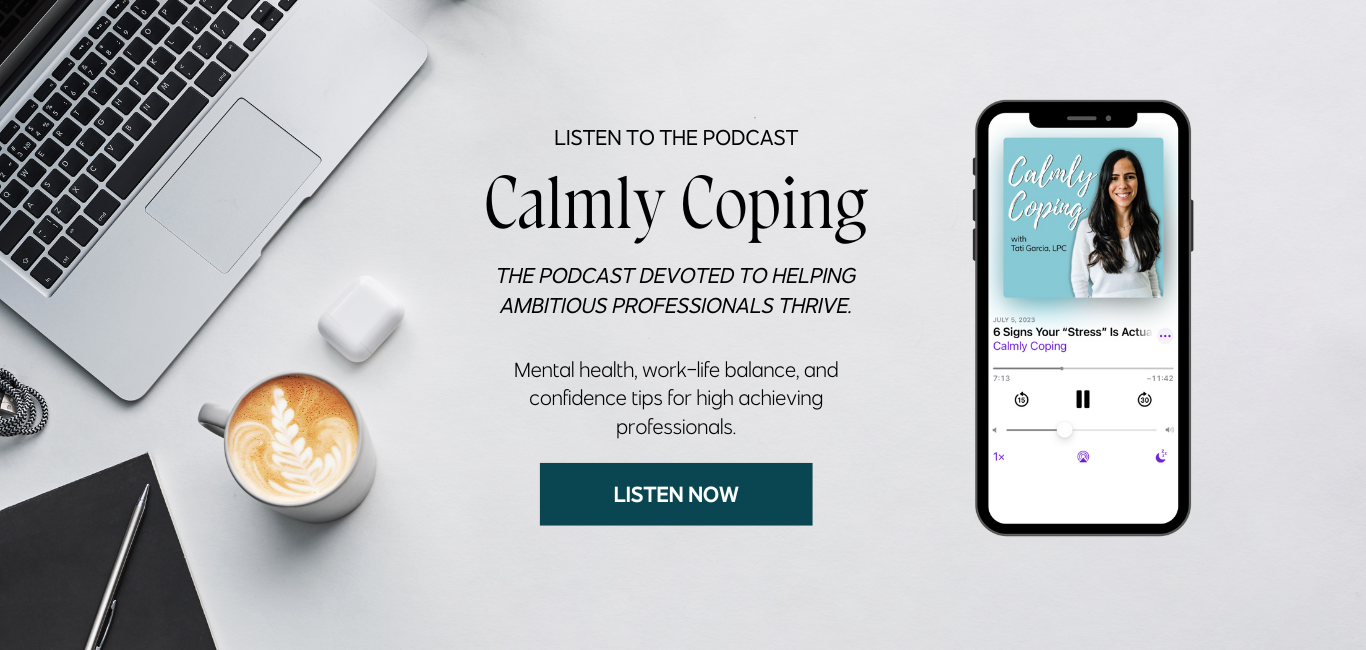Did you know you might be recreating your family dynamics at work—without even realizing it? The roles you played growing up could be influencing how you handle authority, conflict, and even your own needs in the workplace. In this episode, we’re breaking down how your upbringing shapes your behavior at work, and what you can do to change it.
In this episode, you will learn:
- How we recreate our family dynamics at work
- How the roles of rescuer, people-pleaser, and perfectionist translate from your childhood to the workplace
- How to break the cycle of unconsciously repeated dynamics from your upbringing so you can thrive in your career
LISTEN NOW:
🎧 CLICK HERE TO LISTEN TO CALMLY COPING WHEREVER YOU LISTEN TO PODCASTS
WATCH NOW:
▶️ Learn more about my coaching, therapy, and course offerings here: Work With Me
💬 Submit a message, question, or suggestion to the podcast: Message
FREE TRAINING: Achieve A Calm Mind, Balanced Life, & Empowered Confidence in 90 Days
If you want to learn how to take back control of your life so you can feel calmer and more confident, and learn the tools to spend your time according to what matters most to you (no matter what your schedule is like right now)…

LISTEN, REVIEW, AND SUBSCRIBE TO THE PODCAST!

INTRO/OUTRO MUSIC: Rescue Me (Instrumental) by Aussens@iter (c) copyright 2018 Licensed under a Creative Commons Attribution (3.0) license. http://dig.ccmixter.org/files/tobias_weber/57990 Ft: Copperhead
DISCLAIMER: All content here is for informational purposes only. This content does not replace the professional judgment of your own mental health provider. Please consult a licensed mental health professional for all individual questions and issues.
Interested in diving deeper to get support for high-functioning anxiety?
I offer 1:1 coaching to help high-achievers overcoming high-functioning anxiety so they can feel calmer, more present, and have improved balance in their lives. Click here if you’re interested in learning more and getting started.
Calm, Balanced, & Confident is my comprehensive A→Z self-paced course to help high-achieving professionals overcome high-functioning anxiety so they can feel calmer, balanced, and more confident without the anxiety and overwhelm. Click here to learn more and enroll today.
Looking for ongoing support and guidance with high-functioning anxiety? The Calm & Ambitious Community is the exclusive community for high achievers with high-functioning anxiety. Click here to learn more and join us today!
TRANSCRIPT:
Click to view the episode transcript.
Did you know that you might be recreating your family dynamics at work without even realizing it? The roles you played growing up could be influencing how you handle authority, conflict, and even your own needs in the workplace. In this episode, we’re breaking down how your upbringing unconsciously shapes your behavior at work and what you can do about it.
Welcome to calmly coping. I’m your host, Tati Garcia. I’m a licensed therapist and a high functioning anxiety coach. Calmly Coping is the podcast for people who struggle with anxiety and high functioning anxiety. Each Wednesday, you’ll hear informative episodes with actionable tips about decreasing anxiety, adopting a healthy mindset, and managing your time and energy so you can live a calm and balanced life.
Let’s get started. Thank you so much for tuning in. Maybe this is a surprise to you, or maybe this is news. Many people understand how we can unconsciously recreate our family dynamics, especially roles that we had with parents or caregivers, or roles between parents and caregivers, in our romantic relationships.
And this is something that is often discussed and referenced. in what is called attachment theory. Our attachment to our earliest adult caregiver or figures in our lives and how that affects our adult relationships. And this is when people can kind of end up in the same potentially unhealthy relationships over and over again even though they know that this isn’t serving them, that they don’t want this situation, but it just seems to happen without them having any control over it. However, a lot of people don’t know or think about how this happens in other areas of our lives outside of just romantic relationships because you can’t just remove your upbringing and conditioning from who you are as a person. And so maybe it’s not necessarily the way that you’re interacting with a significant other, but it could be the way that you’re interacting with friends and also in the workplace with authority figures with colleagues and how you’re just showing up at work.
And that’s what we’re going to be talking about today. How potentially the way that you were raised or cultural beliefs or influences, how those things can then affect you unconsciously at work and how this can sometimes keep you stuck in patterns and situations and workplaces that aren’t healthy, that you know, maybe are damaging for you or in situations or behaviors where you’re continuing to sacrifice yourself, but you find it hard to get out of this kind of dynamic and you stay stuck in it because it feels like it’s something that is familiar and maybe outside of your control. For me personally, one way that I’ve noticed that this showed up, especially early on in my career is I noticed that I tended to have this fear and this caution when it came to authority figures and I ultimately came to the realization that But for myself personally, I am a first generation Cuban American and something in my culture that is often taught is a respect for authority figures, sometimes even to the level of fear of authority figures or, you know, deference to anybody that’s in a position of authority.
And so I found that this belief, even though it wasn’t something that I necessarily was Consciously thinking about or aware of came with me into the workplace and made me feel more cautious to speak to bosses and anxious when I was around them and hesitant to bring certain things up and kind of like discuss my needs and always referring to what the boss was saying and things like that in situations.
And so I found that for myself, this cultural influence really affected the way that I. behaved at work? And maybe this is something that you notice for yourself. Maybe it’s not necessarily something cultural, maybe it is, but are there ways that your upbringing and whether that is how you were raised or the values that were prioritized or seen as important and meaningful in your upbringing, how are those things in your Affecting you now in your workplace as an adult.
The thing is that in general, cultural views and values can affect how we approach work. And if you think about it, workplaces vary in how they operate between different cultures. You know, the Western workplace is going to operate very differently from other places in the world. And that is not just coming from the workplace itself, but that is being influenced by the culture at large.
And so are there certain religious, or ethnic, or any other cultural influences that maybe have been conditioned within you from a young age that you’re carrying into your workplace. It’s not to say that these things are right or wrong, and it’s not to say that it’s necessarily harmful, but it’s just about bringing awareness to how you may be repeating these patterns and these beliefs without even really realizing it.
There may be common roles that you could be taking on at work that are analogous to those roles that you played in your family. So maybe you played the role of the rescuer, and that is the role that you’re playing now at work. And that role looks like coming to rescue, you know, being the helper, being the mediator, being the one who is is trying to fix the problems.
And if this is a role you played growing up, then maybe you’re also playing this role at work. Maybe you are trying to fix all the problems. Maybe you’re the one who’s always kind of coming to help others and, you know, being super available and whatever else that can look like. Another way to think about this is you may be familiar with the fight or flight response and this is a survival response that happens in moments where we feel threatened.
But there are also two other reactions that occur and that is freeze and fawn. So freeze is if you’ve ever seen a deer or a bunny when they get scared they kind of freeze. Freeze is a survival response that is similar to playing dead when we feel like there’s no escape in a threatening situation and this can happen in.
Other less threatening situations when maybe you kind of shut down emotionally or verbally and have difficulty with responding. Fawn is the people pleasing response. So this is when you accommodate others needs and are very helpful and aware of how others are feeling and ignoring your own needs in order to keep the peace, in order to make peace.
Things less chaotic and if this is a role that you played in childhood or something that has become a familiar role for you Then you could potentially be playing this role at work. So maybe you are trying to keep the peace Maybe you are trying to help others more than you are yourself. Maybe you are being in that place of putting other people first at any sign of danger and going to this place of prioritizing how other people are feeling over yourself.
And maybe that looks like also a difficulty with setting boundaries, overworking, burning yourself out, putting a lot on your plate. and so on and so forth. Another pattern that can show up is being the perfectionist. So maybe when you were growing up your parents expected you to get straight A’s and you brought home an A and it still wasn’t enough and you had all this pressure put upon you to meet certain expectations and maybe some aspect was prioritized whether it was academics or sports or whatever else and this resulted in you internalizing a lot of this Harsh criticism of it’s not good enough and I need to be perfect.
Otherwise, that means that I’m a failure. And this can be a pattern that you then carry into your workplace where you really are fearful of making mistakes and you’re putting a lot of pressure on yourself and you’re expecting perfection and overworking and constantly doing more and more and never feeling like it’s enough.
Never feeling like you measure up or like you could ever get enough done. praise or validation to fill this emptiness that you feel within because you have learned that your worth is essentially contingent upon getting this praise and feedback, but it still feels like it’s not enough. These are just some examples of how your upbringing and family dynamics can be then replicated in the workplace and you can stay stuck in these familiar patterns of continuing to engage in these behaviors that are ultimately at a detriment to yourself.
And this is what can happen when it comes to our experiences in childhood that are negative. Sometimes they can be to the level of traumatic experiences, if you experienced any sort of abuse, or if you felt as though you were in danger or unsafe. And sometimes it can be things that, you know, any sort of kind of what’s called a little t trauma by us therapists.
And that is anything that had a negative effect on you, but wasn’t necessarily putting you in a place of danger. And it could be just recurrent patterns where maybe your parents had the intention of helping you, but they were really putting pressure on you. And you know, on the extreme end, this can go to emotional abuse.
However, regardless of whether you categorize this as abuse or not, or trauma or not, Our childhood experiences influence us and when it’s a behavior that can come about as a way of helping you to get through a situation where you’re essentially feeling stuck and like there’s no escape as a child. And so you may develop certain coping mechanisms and patterns and behaviors to survive and get through that situation.
However, moving on into adulthood, oftentimes these patterns and roles that we play are no longer helping us to survive. And they’re often harming us more than they are helping us. And that’s when it can be advantageous to understand and recognize what’s happening to bring awareness to this and to be compassionate that this isn’t something that you chose.
This is something that you have learned that has been conditioned and also to not necessarily blame on parents or caregivers. Of course, that is not to absolve them of responsibility, but it is just to kind of recognize that the actions of other people are often coming from, especially when it comes to, we’re talking about parents, comes from the way that they were raised and the things that they learned.
Of course, if it is any type of abuse or trauma that you experience, then it is absolutely their fault and anything that is coming from an adult is their fault and their responsibility, especially towards a child. However, when I say this isn’t about playing the blame game, it’s not about going to your parent and saying, this is all your fault because at the same time in adulthood it is also our responsibility to recognize and work through the things that are affecting us and sometimes holding on to that blame and anger and resentment can harm us more than it helps the situation or more than it’s harming the other person. I have often noticed that when these family dynamics get repeated, that in the clients that I work with, this looks like I mentioned before, this behavior of ignoring your own needs, of putting other people’s needs first, which results in those behaviors of avoiding conflict, maybe when it comes to speaking up for yourself or setting a boundary, overworking and Continuing to push yourself harder and harder, even though you know that you might need rest, and you might need to take a step back.
And maybe constantly trying to fix things, and being the problem solver and the fixer in situations, and always going above and beyond, even though that’s something that’s not always available or possible for you. These are just some of the ways that those dynamics can show up and the first step of making any change, especially when it comes to Unconscious repeated patterns and behaviors and when I say unconscious it is beneath our conscious awareness.
We’re not actively thinking about it We’re not trying to do these things, but they’re happening because it’s like our brain on autopilot It’s just following these same patterns that it has done for other people So bringing awareness is the first step to making change and recognizing how this shows up.
So if any of these examples that I shared during this episode today resonated with you, maybe you can take some notes, write it down, and recognize, okay, in the past week, how have I demonstrated these behaviors? What kind of experiences did I have in childhood that affected this? And this can be something for you to continue to bring awareness to, and you can also get the support of a therapist or a coach to help you to work through these issues.
If you’re interested in learning more about my services, then you can check out the link in the description for how you can work with me. And this is something that I absolutely help my clients to work through when it comes to anything related to trauma or the past, that’s typically therapy. Whereas with coaching it’s more present focused and to work on helping you to change these behaviors not necessarily diving into the past and trauma.
And you can also start to change these behaviors by building the confidence to behave differently. So maybe setting a boundary where normally you may have been hesitant to do so, or maybe it is having a conversation with your boss that normally you would have avoided or been hesitant to have, or some other behavior that’s going to help you to act and behave differently than what your conditioning is. It’s going to feel uncomfortable at first, but the more and more that you do it, and the more that you practice, the more comfortable it becomes. And then that starts to become the automatic behavior. And that is how you can overwrite and heal from essentially the generational trauma and wounds that you may have inherited.
This can be a complicated process and I encourage you to be compassionate with yourself when starting to dive into the past or when starting to become aware of how you may be unconsciously repeating these patterns in your life. And if you ever are having any significant mental health struggles or if it’s really difficult to revisit something from the past, then that’s a sign that it could be helpful to get support from a therapist who is trained in trauma informed approaches to help you to work through those things.
This is something that I do with my therapy clients using hypnotherapy and using other trauma informed techniques to help them to work through and essentially rewrite the way that they feel about these things, heal from these patterns and to learn how to behave differently, getting and tapping into the unconscious so then it can become more conscious and you can actually start to feel more of a sense of control in your life.
I’d love to hear your thoughts on this topic. You can leave a comment if you’re watching on YouTube or if you are listening. Thanks so much for listening. If you like what you heard, please share this episode with a friend and please subscribe and leave me a review on iTunes. Also, remember to check me out online at CalmlyCoping.com and connect with me on Instagram at TatianaGLPC. All content here is for informational purposes only. This content does not replace the professional judgment of your own mental health provider. Please consult a licensed mental health professional for all individual questions and issues. Till next time, I’m Tati, and this has been Calmly Coping.


Until next time…













